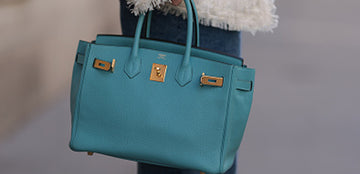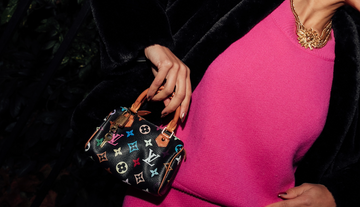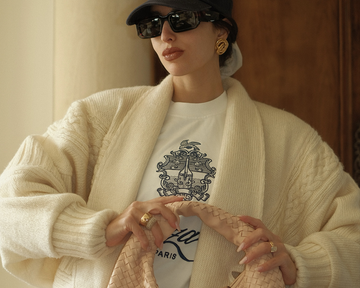Industry Insider Series: Besma Whayeb On The Rise Of Pre-Loved Fashion And Sustainable Purchases
Feb 21, 2020

The Open for Vintage Industry Insider series invites leading voices within the fashion, sustainability and vintage industries to share their insights and thoughts, as part of our mission to grow the conversation around choosing vintage in 2020.
This month, we invited author of the Curiously Conscious blog and founder of Ethical Influencers, Besma Whayeb to share her predictions on the rise of pre-loved fashion and sustainable purchases.
Sustainable fashion is in, and it really is here to stay. In fact, it’s likely to become the only type of fashion available, if we’re to meet the UN’s Sustainable Development Goals and reduce global temperatures from rising to over 1.5°C by 2030.
That said, it’s certainly had a face-lift over the past few years, going from hemp kaftans to Swarovski-embellished upcycled pieces – and there’s so much more to come.
As a sustainable fashion advocate, I’ve been following the industry for five years now, writing from the point of view of a typical shopper on my blog, Curiously Conscious. Here are my insights and predictions for the future…
SUSTAINABLE MATERIALS WILL EDGE OUT HARMFUL ALTERNATIVES
Have you noticed a huge emphasis on sustainable materials recently? Me too. While organic cotton became popular over a decade ago, it’s only now that high-street brands and haute couture alike are adopting wholly sustainable materials for their collections – rather than small nods and bolt-on collections.
I’m particularly interested in the rise of recycled and regenerated materials - such as vegan leather made from pineapple leaves, recycled nylon made from fishing nets, and down jackets using ex-pillow stuffing. Of course, these circular practices are nothing new when you look at the vintage market. High quality materials and craftsmanship leads to a constant cycle of buying-and-selling, which I love!
VINTAGE WILL INCREASE ITS VALUE
While vintage fashion has remained a steady sustainable option, 2020 brings a wave of new shoppers who are shaking off the stigma around pre-loved pieces, and bringing new demand to vintage and second-hand items. Demand for existing pieces is rising because climate-conscious shoppers are avoiding new items in favour of those that have been loved and looked after. This, in turn, reduces demand for virgin materials and labour.
Classic pieces, such as the Chanel Flap Bag will continue to hold their value, if not increase, while we can expect to see even more shoppers join platforms such as Open for Vintage, with a view to buy less, buy better, and buy second-hand.
THE WAY WE ENGAGE WITH FASHION IS CHANGING
Alongside this shift from high-street to vintage, many people are enjoying fashion in new ways, such as sourcing one-of-a-kind items from vintage sellers around the world, attending clothes swaps for local fashion gems, and adding pops of high-end pieces through fashion rental platforms into their wardrobes. What ties all these new ways to engage with fashion together is the mindset of buying less, and buying better, with a view of impermanence over our wardrobes. What I love to wear now may be different in 12 months, but I know with investment pieces, I can sell, re-sell, swap, and rent. There’s so much to explore! As Co-Founder of The Haulternative Closet, a bi-annual luxury fashion clothes-swap happening across London and supported by Global Fashion Exchange, I can attest to this new spirit to share clothes, give pieces a new life, and find joy in mixing up styles!
TRANSPARENT BRANDS WILL BEAT THE REST
And finally, let’s talk about how brands talk. Let’s be honest: no-one likes to be lied to. When the Rana Plaza collapse happened in 2013, many shoppers were appalled to find out their clothes had been made by people working in unsafe, forced labour conditions, and had lost their lives because of it. From it, Fashion Revolution was born, and today it’s a global movement with over 3.25 million supporters. Today, many of us are asking the places we purchase from to tell us how these garments were made – by who, from what material, and with what impact. Brands who are transparent about their people, their materials, their processes, and their attitude towards the climate crisis will beat out the rest.
The archaic attitude to protecting ‘trade secrets’ and prioritising profit ‘above all else’ got the fashion industry – among others – into this mess in the first place, so it’s the new voices who are working collaboratively and openly who are swiftly overtaking the old guard. If you’re a big fan of the classic fashion houses, you can still access them without guilt through luxury fashion resales platforms like Open for Vintage, who offer all the style, with none of the impact! As Open for Vintage continue to work towards growing awareness and conversation around the sustainable benefits of shopping vintage, and with carbon-neutral shipping launching in the coming weeks, it really is a sustainable style solution that can't be ignored.






